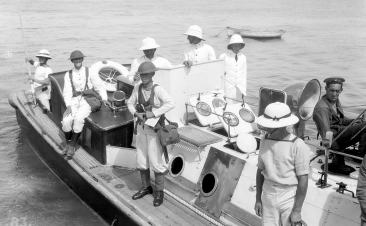Pages in Section 4

The Rest of Palestine in 1929
ii. The Hebron Massacre
iii. The Rest of Palestine in 1929
Next Section
 There would have been far more trouble in Haifa, Jaffa and southern Galilee during August 1929 if two Royal Navy ships H.M.S. Barham and H.M.S Courageous weren't already anchored in Haifa Bay. They lent the police the support of both marine forces and sailors.
There would have been far more trouble in Haifa, Jaffa and southern Galilee during August 1929 if two Royal Navy ships H.M.S. Barham and H.M.S Courageous weren't already anchored in Haifa Bay. They lent the police the support of both marine forces and sailors.
When the marines opened fire in an attempt to quell an Arab attack on the Sephardic Jewish quarter of the city, located near Haifa's railway station, there were many dead and wounded on both sides. The naval ratings stayed on in Haifa and spent six weeks helping the police settle the surrounding countryside.
There was such a shortage of Police in Palestine as a whole during the 1929 riots that British civilians were roped in as special constables, amongst them was a whole group of theological students on a field course in Jerusalem.
The Transjordanian Frontier Force were also called in to help.
In most of the country law and order was soon restored. However, there was one final tragedy at Safad where, in spite of police efforts to protect them, Arabs killed a number of Jews.
By the time things settled down, the casualty count was 138 Jews killed and 399 wounded, 110 Arabs killed and 232 wounded, mostly by British Forces plus a further six Arabs killed by Jews. During this troubled period, just 120 British Police Officers had prevented the country from descending into chaos.
Alan Saunders, the Acting Commandant in the absence of his superior in Britain, was awarded the King's Police Medal for Meritorious Service.
Meanwhile back in England, the British government was trying to establish both Arab and Jewish Agencies to assist the administration in guiding the country towards independence.
The Jews agreed to a Jewish Agency, but the Arabs refused an Arab Agency, demanding instead sole right to govern their own land.
The British government established the Jewish Agency on 14th August. One of its main duties was to choose recipients for sponsored immigration permits allotted for the year. Since appalling pogroms were taking place in Eastern Europe, the Jewish Agency gave priority to Russian and Polish Jews. This continued even after the rise of the Nazi party in Germany in 1933. Many German Jews, thanks to the Transfer System agreed with the Nazis, had sufficient funds to sponsor themselves, but still more entered the country as illegal immigrants.
Before long the Jewish Agency came to be regarded as the de facto Jewish government.